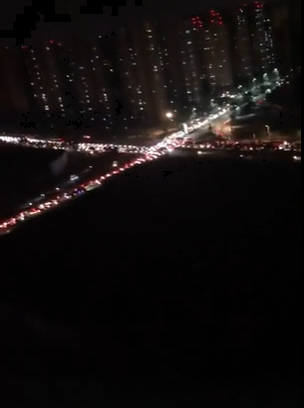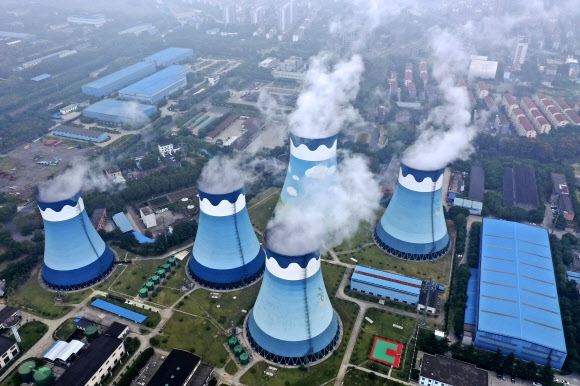China is facing new power restrictions to meet the country’s carbon emission related goals. Street and traffic lights are being turned off, stores are being forced to do business by candlelight and factories equipped with large-scale manufacturing facilities are facing shutdowns, all in an effort to implement the nation’s strict policy of curbing carbon emissions. As a result, crude oil and gas prices are on the rise. With winter approaching, the power restrictions are a matter of concern for many.
 |
| ▲ This photo is captured some of the videos taken of Liaonin Province's blackout because of China's power shortage.(Photo from Yahoo News) |
While curbing emissions is a valiant goal, the real reason for the power shortage is due to the diplomatic strain between China and Australia. Relations between the two nations began to deteriorate April last year when Australia insisted on an independent international investigation on the origin and spread of COVID-19. Following the diplomatic row, China banned imports of Australian coal creating an internal energy shortage. China mainly relies on thermal energy to generate electricity, but the ban on imports of mineral energy resources such as iron ore and coal has meant they are no longer able to meet their power generating needs. At the outset of the conflict, critics believed Australia would suffer the brunt of the dispute, not being able to lower its economic dependence on China, but the need for their coal resources outweighed their losses. In response, China pushed for diversification of energy imports, but coal from South Africa and Colombia is more expensive than Australia and is of lower quality.
The Chinese government has insisted the main reason for the power shortage was their regulation of fossil fuel power generation, including coal, instituted to meet their target carbon dioxide emissions. China has enough buried coal to solve the current power shortage, however, due to their own carbon emission regulations, it is impossible for them to harvest it. Despite the challenges they are facing, local governments are strictly adhering to the plan in support of the Chinese president who vowed to achieve carbon neutrality before 2060. President Xi Jinping said that the goal was to show Beijing's blue sky to the world during the Winter Olympics in Beijing in February next year.
China’s strict regulations are making it hard to operate business as usual. It is rapidly becoming the norm in China to experience sudden power outages in buildings and shopping malls in Shenyang city. Stores affected are doing business by candlelight, and factories are also continuing their work relying on candles. In addition, roads are becoming a series of danger zones as traffic and streetlights are being turned off.
 |
| ▲ On the 27th, thermal power plants in Nanjing is in operation. Nobody knows when thermal power plants will stop again. (Photo from Seoul News) |
Hong Kong media reported that China’s coal reserves are down to about 15 days’ worth of energy production. They also reported that the current power shortages in China are likely to heighten in winter. When the temperature drops, people will need heating power. The increased demand for power and heating will make the current power shortage more serious.
The damage to the domestic and global economy has been significant. This is because factories can’t operate without power. Guangdong, Zhejiang, and Jiangsu Provinces are regions suffering the most from the power shortages. They have a higher concentration of manufacturing facilities. The economic damage caused by the power shortages in those regions are being felt beyond the Chinese border. POSCO’s manufacturing factories in Jiangsu Province have been forced to halt part of their major product lines since last month. Factories that supply parts for Apple and Tesla in the United States were shut down, while food, textile, and shoe factories were also impacted. In some cases, factories are being forced to turn on their generators or work at night when there is more electricity available to meet their contracted delivery dates. However, it is more expensive to run a generator. To make matters worse, the recent record heavy rains in coal-producing areas have caused disruptions in the coal supply chain. Factories are operating using emergency countermeasures, but nobody knows when they will be forced to stop again.
The Dankook Herald (DKH) interviewed Professor Lee Ji-soo in the Department of International Trade at Dankook University (DKU) to learn more about the matter. Lee said this issue is not just a Chinese problem. Global enterprises are carefully following the matter because the shortages could disrupt the global supply-chain for large companies like Apple, Tesla, and Samsung who operate factories in China. Lee added “Most countries will suffer a loss due to the short supply of energy in China. The rise in prices for raw materials impact the cost of the finished product. Eventually, that additional cost burden will be imposed on customers.” Lee also pointed out that Korea will be particularly impacted by this problem. China is Korea’s biggest trading partner. These power supply shortages could increase the disruption of production and supply, including the delivery date of finished goods and products being launched in trade. To avoid these problems, companies should secure their supply of required components and prepare countermeasures for carrying goods. “Naturally, this issue affects the world, so it is hard to find a third country who could deal with the amount of trade losses looking to be recovered,” she said. She later added, “Through KOTRA (Korea Trade-Investment Promotion Agency) and industry trade associations, companies should seek out active support for their problems and the establishment of countermeasures.”
China is organically connected to the world, and their power supply shortages are impacting far beyond their borders. Korea is not immune to the process, so it is important we address the matter internally too. Let’s hope the power shortages will be resolved soon, so that the global economy can once again settle in, and consumer prices can return to normal.
오유준, 최민지, 손수빈 dankookherald@gmail.com

![[Campus Magnifier] Let's Surf the Library!](/news/photo/202404/12496_1765_4143.jpg) [Campus Magnifier] Let's Surf the Library!
[Campus Magnifier] Let's Surf the Library!
![[Campus Magnifier] Let's Surf the Library!](/news/thumbnail/202404/12496_1765_4143_v150.jpg)





